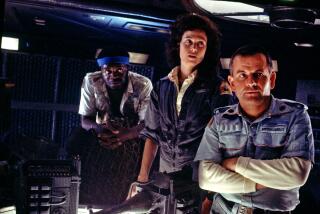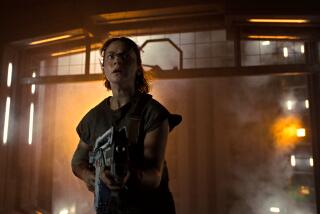‘Resident Alien’ is an amusing trip to Spielberg country, where ETs live in our midst
- Share via
That there is nothing novel about the basic premise of “Resident Alien,” a showcase for actor Alan Tudyk premiering Thursday on Syfy, is not a problem. Indeed, in its very familiarity the template — extraterrestrial(s) stranded on and/or infiltrating Earth hides its/their identity — becomes almost a blank slate, allowing as many variations as “Two people with different temperaments live together,” the mulch from which a thousand comedies have bloomed. “Mork & Mindy,” “The Coneheads,” “The Brother From Another Planet,” “Roswell,” the “Roswell” reboot, “The Neighbors,” “Invader Zim” and for that matter Superman are among the many examples to spring from that well.
The ’60s sitcom “My Favorite Martian” and the 1976 Nicolas Roeg film “The Man Who Fell to Earth” (from the novel by Walter “Queen’s Gambit” Tevis and getting a TV makeover itself) were particularly on the mind of writer Peter Hogan when he created, with artist Steve Parkhouse, the ongoing comic-book series on which “Resident Alien” is based.
Developed as a dramedy by Chris Sheridan, the Syfy series performs the surgeries necessary to turn paneled page into effective television — adding new sources of pressure and relief, making characters more colorful and relationships more complicated — without amputating the source material. The results are good; whatever critical nitpicking I did along the way — it’s a compulsion as well as a career — I thoroughly enjoyed the seven episodes (out of 10) available for review. I smiled, I laughed, I cared.
The setting has been changed from the Pacific Northwest to Colorado, oddly, given that the show, set in a mountainous, snowbound small town called Patience, has obviously been filmed in British Columbia. In any case, the location, and the fact that the eponymous alien, a Fish Out of Water known here only as Harry Vanderspiegle (Tudyk), finds himself drafted as the new town doctor when the old town doctor is found mysteriously dead, bring in a hint of “Northern Exposure.” Indigenous characters (and actors) are more than usually present.
In “Earth to Ned,” from the Jim Henson Company and Disney+, an alien sent to invade Earth instead falls in love with it, and hosts a talk show.
Harry has assumed the identity and form of the reclusive physician of that name and shape, known to be a living nearby in a cabin by a lake, and whom he killed after wandering in out of the elements — plausibly in self-defense, to keep the character sympathetic. At the same time Harry has less-than-sympathetic business to take care of, if he can retrieve some alien technology from the snowbound mountains above the town, and his vacillation between good and bad alien, often within a single sentence, fuels the comedy and drama, and gives the character something like the beginnings of a heart.
In the short run, Harry — who has taught himself to act human, after a fashion, by watching episodes of “Law & Order” — happily takes on the role of forensic pathologist. That mystery quickly fades into the background, with brief reminders that there are questions yet to be answered, and some good lines about Jerry Orbach and the police and prosecutors of New York City. I assume it’ll be dealt with by the end of the season, but there will be other investigations underway, as well as some well-handled human business that has little or nothing to do with the sci-fi plotlines. (Harry isn’t the only one with a secret or needs.)
Asta Twelvetrees (the excellent Sara Tomko), the dead doctor’s nurse, is escaping an abusive marriage, and has a thorny relationship with her father, Dan (Gary Farmer), who cooks at the diner where a lot of scenes take place; it’s a veritable Arnold’s. “Sometimes just feeling human is alien to me,” Asta will say at a meaningful moment. As the town bartender, D’Arcy, Alice Wetterlund makes an equally strong impression; it’s the sort of wisecracking, up-for-too-much-fun role that can easily become painful, pitiful or pathological but Wetterlund, a comedian as well as an actress, brings a kind of flickering light to it, a sense of being in control of being out of control.
For reasons of drama, fourth-grader Max Hawthorne (Judah Prehn) is able to see Harry in his true form, much to his initial terror. (Their adversarial but evolving relationship is a highlight of the series; Prehn carries more than his weight.) With new friend Sahar (Gracelyn Awad Rinke), a hijab-wearing Muslim — more notable in the context of Hollywood than within the series, where it serves the plot for a moment and then becomes unremarkable — he‘ll go sleuthing in a movie-type town where the prolonged absence of a child from home at night is nothing worth noting; we are in Spielberg country here. (Amblin, his production company, is, not surprisingly, involved in the series, and you may think of “Close Encounters” once, twice or thrice, minus the wide-eyed wonder.)
“The Queen’s Gambit,” about a female chess prodigy (Anya Taylor-Joy), is exciting, entertaining and convincing — especially when it comes to the game itself.
Tudyk, whom some will remember from “Firefly” and others from “Suburgatory,” is in fine form as an alien in ill-fitting human clothing, getting the hang of laughter and sex. (There is a good bit of genital humor and some salty language. As Sahar says, she is not allowed to say bad words but she can hear them; perhaps that is the yardstick you apply to your house.) In his late 40s, Tudyk sports a kind of worn boyishness that makes a good fit for a character at once sophisticated and in over his head, losing and regaining focus, managing or mismanaging his expressions, improvising, sometimes adeptly, often ineptly, from moment to moment, as the writing room requires. (There is a certain inconsistency to Harry’s understanding of Earthly concepts that seems tied in part to not wanting to lose a good joke.)
“You must have Colorado fever,” he says, inventing a disease. “You have all of the symptoms.”
“I’ve never heard of Colorado fever.”
“That’s one of the symptoms.”
Harry finds humans pathetic: “What lonely species,” he muses in voice-over thought bubble as he sits in the local diner. “Not only did humans invent dogs for companionship, they insist on gathering together in groups to eat food. All I need is an empty room, a spoon and a pie.” But, of course, this being a dramedy of character and not an pre-apocalyptic action tale, his new companions and human shell will begin to have an effect on him, for better or worse. Aliens are people too, however much they may look down us.
More to Read
The complete guide to home viewing
Get Screen Gab for everything about the TV shows and streaming movies everyone’s talking about.
You may occasionally receive promotional content from the Los Angeles Times.







